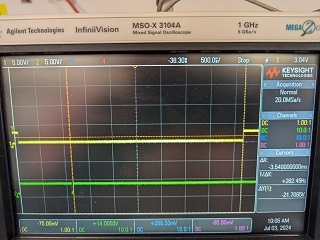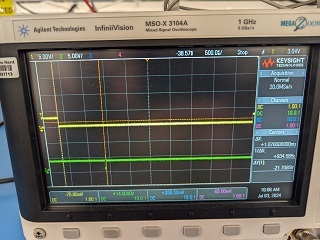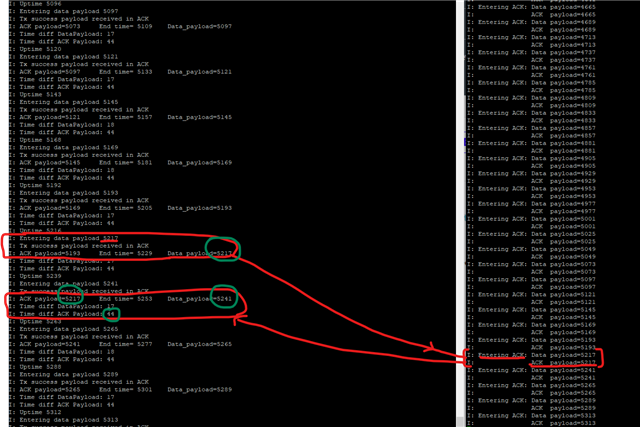Hi,
I'm trying to measure message travel time using Gazel and k_uptime_get() so I can understand the packet intervals.
I'm using gzll_ack_payload_device and gzll_ack_payload_host from v2.6.1 sample apps modified to send k_uptime_get() as the payload and measure the delta received in the ACK's payload (see git diffs below).
I'm seeing time deltas of 115 msec when I try to use k_uptime_get() stamping.
Then I used LED flashing on both DK boards to be able to measure the timing and I see 1 msec from device to host and 3 msec from host ACK back to device which makes more sense (Analyzer images below)
What is the reason for k_uptime_get() to return wrong reading? I checked the build/zephyr/.config file and I see CONFIG_SYS_CLOCK_TICKS_PER_SEC=32768.
Thanks,
Guy.
diff --git a/samples/gazell/gzll_ack_payload_device/src/main.c b/samples/gazell/gzll_ack_payload_device/src/main.c
index 58bb7fc93..1e8b863ea 100644
--- a/samples/gazell/gzll_ack_payload_device/src/main.c
+++ b/samples/gazell/gzll_ack_payload_device/src/main.c
@@ -17,7 +17,7 @@ LOG_MODULE_REGISTER(app);
#define PIPE_NUMBER 0
/* 1-byte payload length is used when transmitting. */
-#define TX_PAYLOAD_LENGTH 1
+#define TX_PAYLOAD_LENGTH 8
/* Maximum number of transmission attempts */
#define MAX_TX_ATTEMPTS 100
@@ -51,6 +51,7 @@ K_MSGQ_DEFINE(gzll_msgq,
static K_SEM_DEFINE(main_sem, 0, 1);
static struct k_work gzll_work;
+static uint64_t start_time, end_time;
static void gzll_tx_result_handler(struct gzll_tx_result *tx_result);
static void gzll_work_handler(struct k_work *work);
@@ -99,8 +100,10 @@ int main(void)
}
#endif
- data_payload[0] = ~dk_get_buttons();
+ // data_payload[0] = ~dk_get_buttons();
+ *(uint64_t *)data_payload = k_uptime_get();
+ LOG_INF("Entering data payload %llu", *(uint64_t *)data_payload);
result_value = nrf_gzll_add_packet_to_tx_fifo(PIPE_NUMBER, data_payload, TX_PAYLOAD_LENGTH);
if (!result_value) {
LOG_ERR("Cannot add packet to GZLL TX FIFO");
@@ -170,11 +173,13 @@ static void gzll_device_report_tx(bool success,
void nrf_gzll_device_tx_success(uint32_t pipe, nrf_gzll_device_tx_info_t tx_info)
{
+ LOG_INF("Tx success payload %s in ACK", tx_info.payload_received_in_ack?"received":"not received");
gzll_device_report_tx(true, pipe, &tx_info);
}
void nrf_gzll_device_tx_failed(uint32_t pipe, nrf_gzll_device_tx_info_t tx_info)
{
+ LOG_INF("Tx failed");
gzll_device_report_tx(false, pipe, &tx_info);
}
@@ -207,6 +212,7 @@ static void gzll_tx_result_handler(struct gzll_tx_result *tx_result)
if (tx_result->success) {
if (tx_result->info.payload_received_in_ack) {
+ end_time = k_uptime_get();
/* Pop packet and write first byte of the payload to the GPIO port. */
result_value = nrf_gzll_fetch_packet_from_rx_fifo(tx_result->pipe,
ack_payload,
@@ -214,22 +220,32 @@ static void gzll_tx_result_handler(struct gzll_tx_result *tx_result)
if (!result_value) {
LOG_ERR("RX fifo error");
} else if (ack_payload_length > 0) {
- err = dk_set_leds(ack_payload[0] & DK_ALL_LEDS_MSK);
+ err = dk_set_leds_state(0, DK_ALL_LEDS_MSK);
if (err) {
LOG_ERR("Cannot output LEDs (err: %d)", err);
}
+ // LOG_INF("ACK payload %llu end time %llu", *(uint64_t *)ack_payload, end_time);
+ LOG_INF("Time diff %lld", k_uptime_delta((uint64_t *)ack_payload));
}
}
} else {
LOG_ERR("Gazell transmission failed");
}
+ k_msleep(100);
/* Load data payload into the TX queue. */
- data_payload[0] = ~dk_get_buttons();
+ start_time=k_uptime_get();
+ // LOG_INF("Uptime %lld", start_time);
+ *(uint64_t *)data_payload = k_uptime_get();
+ // LOG_INF("Entering data payload %llu", *(uint64_t *)data_payload);
result_value = nrf_gzll_add_packet_to_tx_fifo(tx_result->pipe,
data_payload,
TX_PAYLOAD_LENGTH);
if (!result_value) {
LOG_ERR("TX fifo error");
}
+ err = dk_set_leds_state(DK_ALL_LEDS_MSK, 0);
+ if (err) {
+ LOG_ERR("Cannot output LEDs (err: %d)", err);
+ }
}
diff --git a/samples/gazell/gzll_ack_payload_device/src/main.c b/samples/gazell/gzll_ack_payload_device/src/main.c
index 58bb7fc93..1e8b863ea 100644
--- a/samples/gazell/gzll_ack_payload_device/src/main.c
+++ b/samples/gazell/gzll_ack_payload_device/src/main.c
@@ -17,7 +17,7 @@ LOG_MODULE_REGISTER(app);
#define PIPE_NUMBER 0
/* 1-byte payload length is used when transmitting. */
-#define TX_PAYLOAD_LENGTH 1
+#define TX_PAYLOAD_LENGTH 8
/* Maximum number of transmission attempts */
#define MAX_TX_ATTEMPTS 100
@@ -51,6 +51,7 @@ K_MSGQ_DEFINE(gzll_msgq,
static K_SEM_DEFINE(main_sem, 0, 1);
static struct k_work gzll_work;
+static uint64_t start_time, end_time;
static void gzll_tx_result_handler(struct gzll_tx_result *tx_result);
static void gzll_work_handler(struct k_work *work);
@@ -99,8 +100,10 @@ int main(void)
}
#endif
- data_payload[0] = ~dk_get_buttons();
+ // data_payload[0] = ~dk_get_buttons();
+ *(uint64_t *)data_payload = k_uptime_get();
+ LOG_INF("Entering data payload %llu", *(uint64_t *)data_payload);
result_value = nrf_gzll_add_packet_to_tx_fifo(PIPE_NUMBER, data_payload, TX_PAYLOAD_LENGTH);
if (!result_value) {
LOG_ERR("Cannot add packet to GZLL TX FIFO");
@@ -170,11 +173,13 @@ static void gzll_device_report_tx(bool success,
void nrf_gzll_device_tx_success(uint32_t pipe, nrf_gzll_device_tx_info_t tx_info)
{
+ LOG_INF("Tx success payload %s in ACK", tx_info.payload_received_in_ack?"received":"not received");
gzll_device_report_tx(true, pipe, &tx_info);
}
void nrf_gzll_device_tx_failed(uint32_t pipe, nrf_gzll_device_tx_info_t tx_info)
{
+ LOG_INF("Tx failed");
gzll_device_report_tx(false, pipe, &tx_info);
}
@@ -207,6 +212,7 @@ static void gzll_tx_result_handler(struct gzll_tx_result *tx_result)
if (tx_result->success) {
if (tx_result->info.payload_received_in_ack) {
+ end_time = k_uptime_get();
/* Pop packet and write first byte of the payload to the GPIO port. */
result_value = nrf_gzll_fetch_packet_from_rx_fifo(tx_result->pipe,
ack_payload,
@@ -214,22 +220,32 @@ static void gzll_tx_result_handler(struct gzll_tx_result *tx_result)
if (!result_value) {
LOG_ERR("RX fifo error");
} else if (ack_payload_length > 0) {
- err = dk_set_leds(ack_payload[0] & DK_ALL_LEDS_MSK);
+ err = dk_set_leds_state(0, DK_ALL_LEDS_MSK);
if (err) {
LOG_ERR("Cannot output LEDs (err: %d)", err);
}
+ // LOG_INF("ACK payload %llu end time %llu", *(uint64_t *)ack_payload, end_time);
+ LOG_INF("Time diff %lld", k_uptime_delta((uint64_t *)ack_payload));
}
}
} else {
LOG_ERR("Gazell transmission failed");
}
+ k_msleep(100);
/* Load data payload into the TX queue. */
- data_payload[0] = ~dk_get_buttons();
+ start_time=k_uptime_get();
+ // LOG_INF("Uptime %lld", start_time);
+ *(uint64_t *)data_payload = k_uptime_get();
+ // LOG_INF("Entering data payload %llu", *(uint64_t *)data_payload);
result_value = nrf_gzll_add_packet_to_tx_fifo(tx_result->pipe,
data_payload,
TX_PAYLOAD_LENGTH);
if (!result_value) {
LOG_ERR("TX fifo error");
}
+ err = dk_set_leds_state(DK_ALL_LEDS_MSK, 0);
+ if (err) {
+ LOG_ERR("Cannot output LEDs (err: %d)", err);
+ }
}





